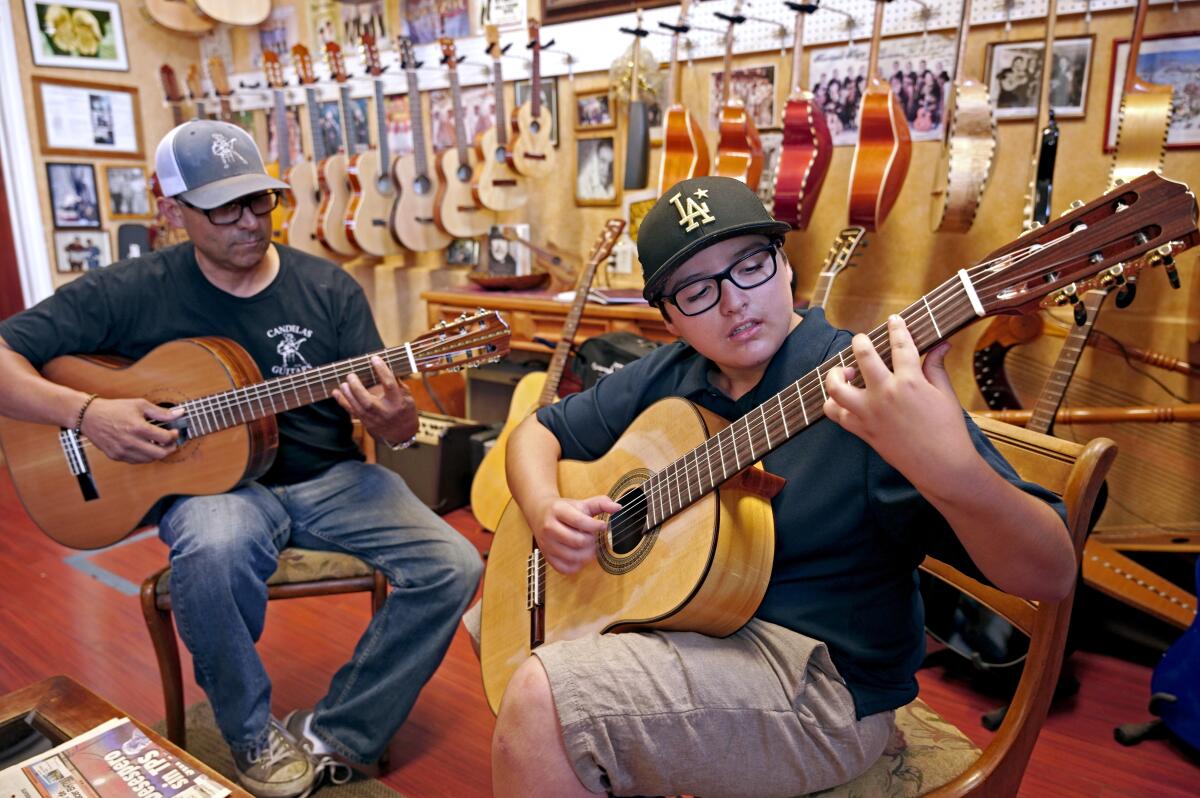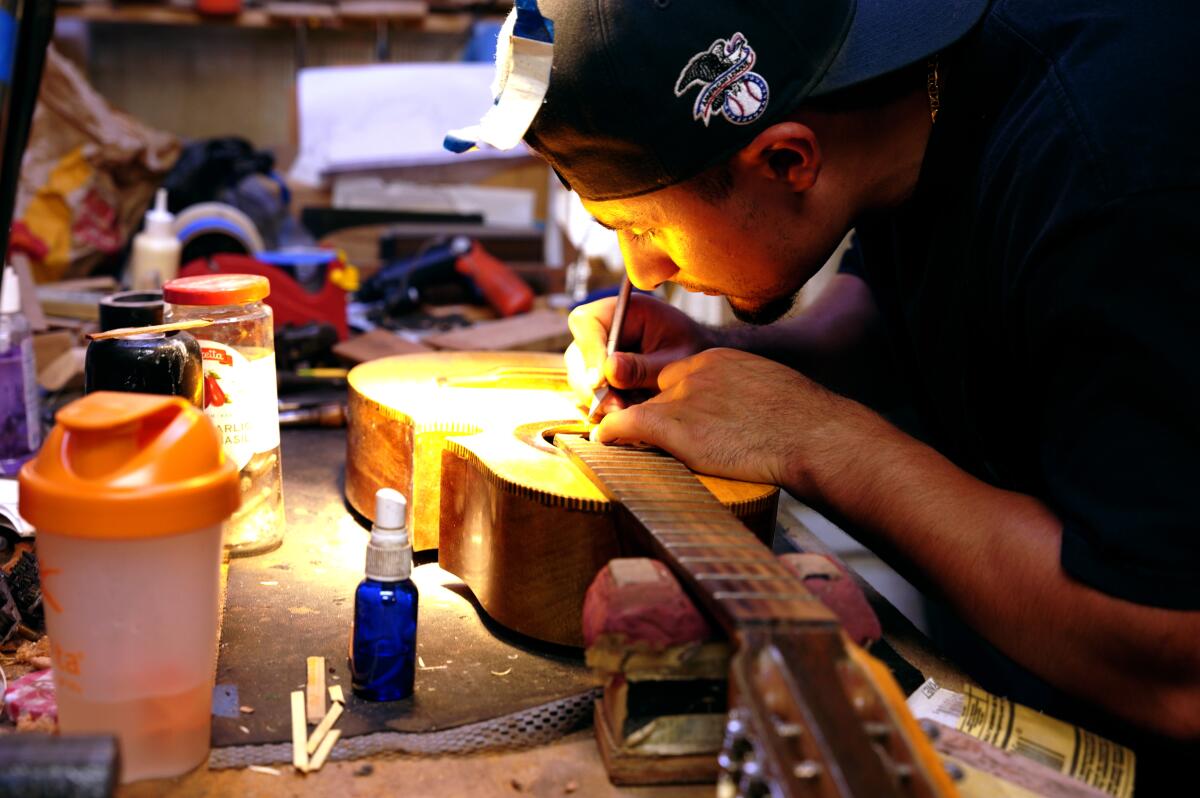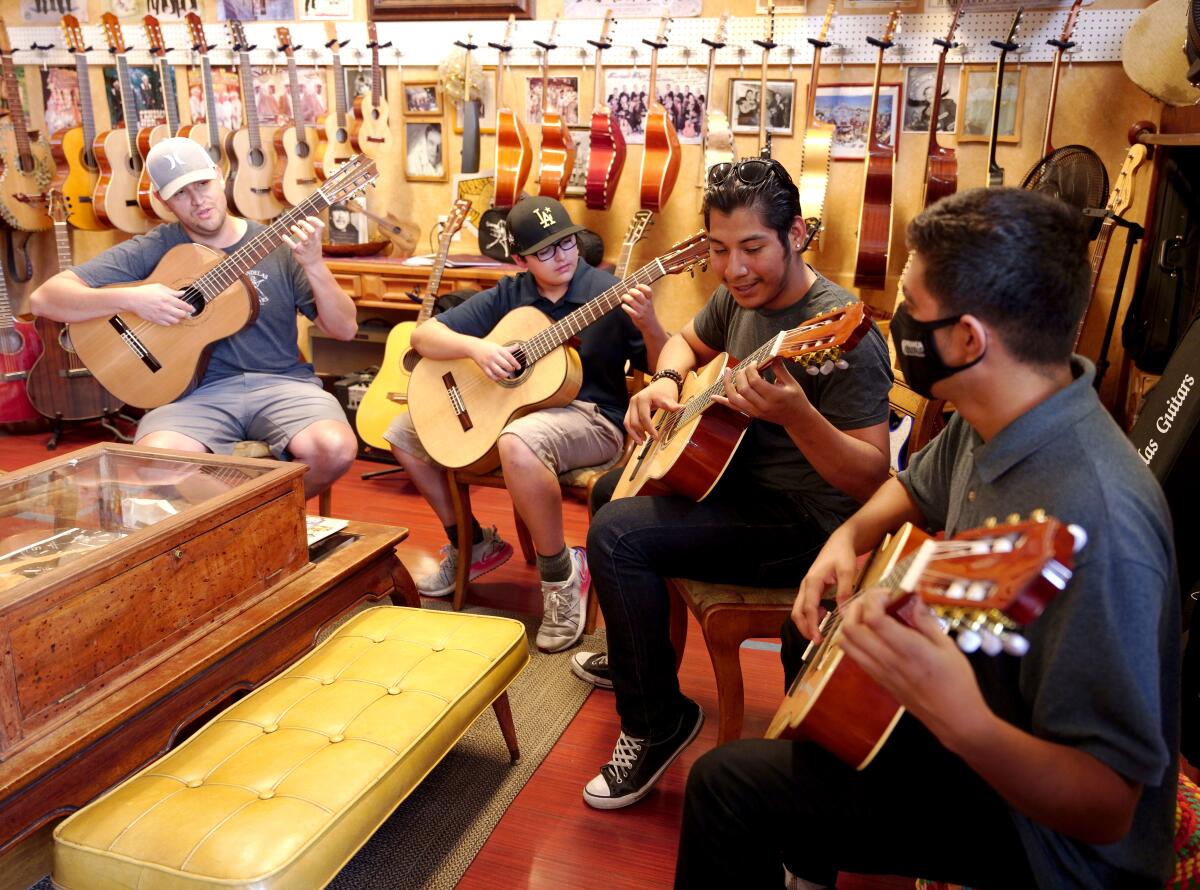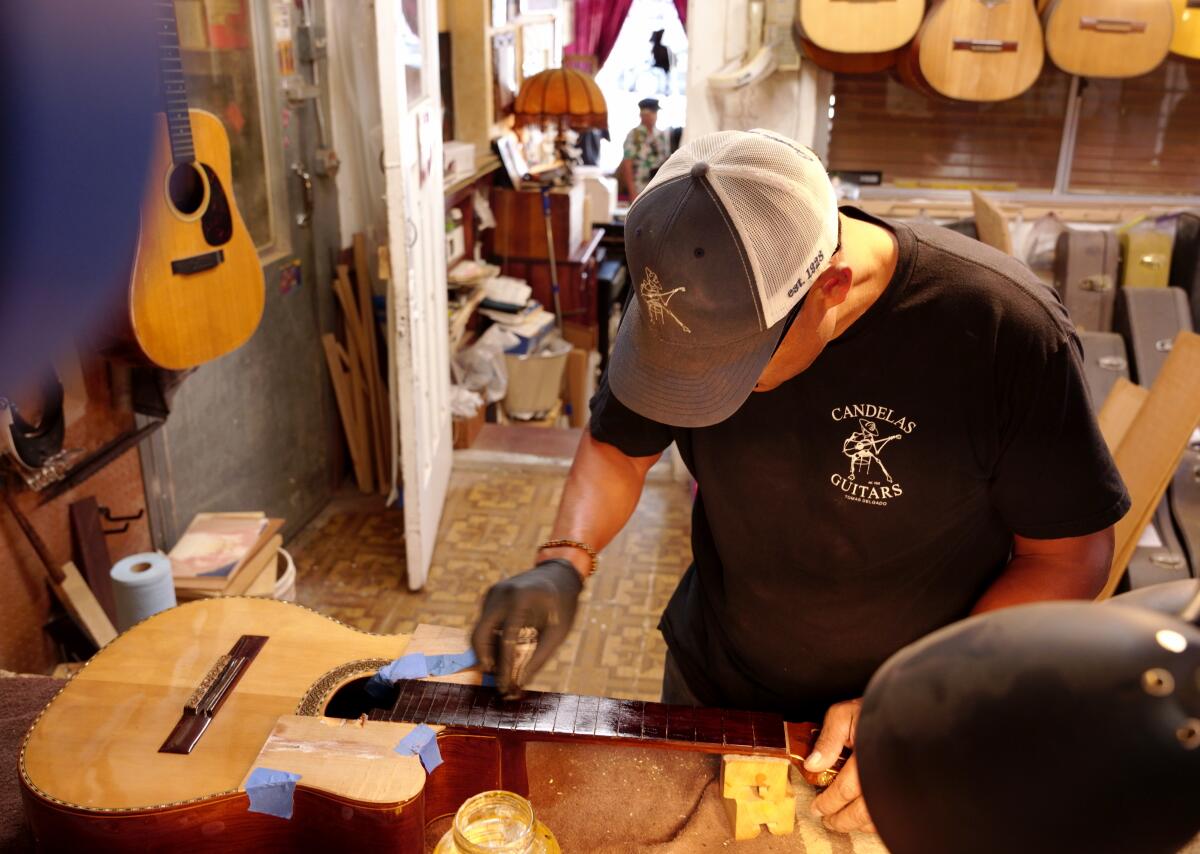Candelas Guitars in Boyle Heights fights to survive, with some famous friends’ help

- Share via
Eloy González sat down, adjusted his glasses, cradled his guitar and set his little fingers to strumming the opening chords of Tom Petty’s “Free Fallin’.”
Eyes closed, the 11-year-old boy’s face broke into a fleeting smile as he played the tune.
Two years ago, Eloy had no idea how to hold the instrument. Now he is a budding talent who progresses very quickly in his guitar classes at Candelas Guitars in Boyle Heights, said his mother, Vanessa González. More than merely a hobby, his lessons serve as an escape from his daily stress and worry over his father’s struggle with pancreatitis.
“They are my therapy,” said Eloy, a sixth-grader at Macy Intermediate School in Monterey Park. “That helps me not to think so much about my father’s illness and what could happen to him. It helps me with the stress of my baseball classes and school, and also to stop thinking that I can’t help my mother with all of her responsibilities.”
Each student who takes guitar lessons at the nonprofit Candelas Music and Arts Foundation has their own story and motivation, said Tomas Delgado, a third-generation member of a family of luthiers, makers and repairers of string instruments. Over the decades the Delgado clan has built guitars for José Feliciano, Raúl Pacheco of Eastside favorite sons Ozomatli, Eric Wilson of the band Sublime, and L.A.-based Guatemalan singer-songwriter Gaby Moreno, among other artists, while also being a pipeline of up-and-coming musicians.

But the scholarships that the organization has offered to low-income students in Boyle Heights and surrounding communities for years may be on the verge of disappearing. Knocked sideways by the pandemic, which brought in-person classes to a halt and caused a steep drop-off in customer flow, Candelas is struggling to stay open. It’s counting on support from the community and a few high-profile friends who’ve stepped up on its behalf.
“We want to continue, but it is very possible that in a few months we will no longer be able to support” the students, Delgado, 53, said in a worried voice over coffee at his shop.
To its students and customers, Candelas offers a warm and welcoming respite in one of Los Angeles County’s poorest working-class neighborhoods. Guitars hang from the walls, including more than 40 from Delgado’s personal collection, and the atmosphere is suffused with the scent of fresh wood. Delgado, the shop’s overseer for the last 27 years, still flashes a smile at everyone who enters, giving no hint of his family’s current travails.
The organization’s humble roots lie in Torreón, Mexico, where brothers Porfirio Delgado and Candelario Delgado — Tomas’ grandfather and great-uncle, respectively — first opened a guitar manufacturing and sales business in 1928.
Moving from Torreón to Juárez in 1932, then to Tijuana in the early 1940s, the family finally settled in the Boyle Heights neighborhood in 1947. Delgado takes pride in showing photos of famous artists who’ve been customers, including Pedro Vargas, the Mexican tenor and actor, and such trios of yesteryear as Los Panchos, Los Dandys and Los Tres Reyes.

Over the years, the Delgado family has earned a reputation in the community for donating money to Southern California missions, local churches and Los Angeles Police Department teen programs, and even donating funds to families of the undocumented workers at the World Trade Center after the 9/11 terrorist attacks. Delgado grew up watching his father, Candelario (a.k.a. “Candy”), and his grandfather Porfirio give back to the community. Delgado promised himself that he would do the same.
“My father always said, ‘Create change within your home and with your neighbors. If you do it, a whole community can change,’” said Delgado, who took over the business when his father died in 1986.
In April 2018, Delgado decided to further his family’s community outreach mission by converting into a nonprofit organization. Teenagers came to Candelas for their individual classes in a small room behind the storefront. There was nothing to visually distract them beside a couple of guitars hanging on the wall and a painting of a man playing guitar.
Delgado believed that it was important to teach students to play guitar in a serene environment appropriate to his approach. The luthier looked for young people who were hungry to learn, and he enlisted musician friends including Gaby Moreno and those from Flor de Toloache and Los Lobos to perform in fundraisers that helped subsidize the 16 youths taking lessons from the store’s instructor, Kenneth Del Río. Other friends and customers pitched in with financial help too.
“We are polishing diamonds here,” Del Río said of his young charges.

But Delgado didn’t know that a strange new virus was about to spread across the planet. Overnight, in-person classes were forced to go online. Ultimately the organization had to let go of 11 students, leaving only half a dozen still taking lessons, which Delgado pays for out of his own pocket. Community events were flung into limbo. Delgado had to put all but two of his four employees on paid leave.
“It was a very negative domino effect,” said Delgado, who now spends much of his workday, starting at 5 a.m., repairing or making acoustic guitars, violins and ukuleles, among other stringed instruments.
Delgado heeded friends’ advice to seek government assistance and apply for bank loans. But, with little track record in running a nonprofit organization, he met with little success.
“I am ashamed to say it, but I have never asked for subsidies from organizations or governments, nor would I know how to do it. My fundraisers have always been organic and directly from the community,” he said.
Vanessa González, Eloy’s mother, said that she’s “very sad to know that my son’s guitar lessons could end at any moment because the necessary funds are lacking.”
“I have seen over the months how Eloy has been able to overcome problems at home by focusing on music,” said the Montebello resident and high school counselor.
Without knowing what the organization that helps him is going through, Isaías García, 17, came to class excited one recent day.
“I’ve grown up with mariachi music and corridos all my life, so learning to play guitar is my dream because everything I can’t say in words I can say with music,” said the 11th-grader at Esperanza College Prep, a charter school in East Los Angeles. “Candelas is my hero.”
For her part, Margarita Juárez, Isaías’s mother, said that his scholarship-funded guitar lessons have helped him to focus on getting good grades and being more helpful around the house. As a seamstress and single mother of three children, she would have a hard time paying for guitar lessons out of her own pocket, after covering rent, food, car upkeep and other expenses.
“Only people with money could afford to pay for these classes in tough times,” the South Los Angeles resident said.
Gaby Moreno, the Guatemalan singer-songwriter and guitarist, who was introduced to Candelas a decade ago by her friend and collaborator, Van Dyke Parks, and has taken part in the fundraisers, said that it would be tragic for the community if the organization closed.
“On his side, Tomas is a person who genuinely cares about his students and about the community,” Moreno said.
Delgado lent her a 12-string guitar that belonged to his grandfather to play a Lydia Mendoza song on Guillermo del Toro’s Netflix series “Cabinet of Curiosities.” The instrument, characterized by an especially robust and melodious sound, was popularized by artists such as Mendoza, a Mexican American guitarist and singer of Tejano and traditional Mexican American music in the early 1930s.
Another marquee-name artist, Los Lobos singer, songwriter and guitarist David Hidalgo, also hopes the community will rally around Candelas, which he said has given much to the area through sponsoring programs such as the LAPD’s youth boxing instruction.
“These types of programs cannot disappear in a low-income community, where young people also deserve to experience different opportunities,” Hidalgo said.
Growing up in East Los Angeles, Hidalgo met Tomas Delgado’s father, Candy, just when he was starting his band.
“I went to repair the instrument, the conversation with Candy began, and a great friendship spread. Since then, every Saturday we went to drink beer and eat carnitas,” Hidalgo said.
Delgado is actively looking for an expert who can help him apply for grants to keep his organization going.
“Our youth is important, and there is nothing better than to know that they can invest their time learning to play a guitar instead of turning to gangs,” he said. “If I know I can make a difference, I will continue asking for help to help these kids.”










